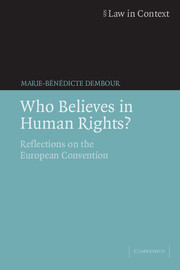Book contents
- Frontmatter
- Contents
- Acknowledgements
- Table of cases
- List of tables
- 1 Introduction
- 2 The Convention in outline
- 3 The Convention in a realist light
- 4 The Convention in a utilitarian light
- 5 The Convention in a Marxist light
- 6 The Convention in a particularist light
- 7 The Convention in a feminist light
- 8 The human rights creed in four schools
- 9 Conclusion: In praise of human rights nihilism
- Appendices
- Select Bibliography
- Index
3 - The Convention in a realist light
Published online by Cambridge University Press: 03 February 2010
- Frontmatter
- Contents
- Acknowledgements
- Table of cases
- List of tables
- 1 Introduction
- 2 The Convention in outline
- 3 The Convention in a realist light
- 4 The Convention in a utilitarian light
- 5 The Convention in a Marxist light
- 6 The Convention in a particularist light
- 7 The Convention in a feminist light
- 8 The human rights creed in four schools
- 9 Conclusion: In praise of human rights nihilism
- Appendices
- Select Bibliography
- Index
Summary
From real law come real rights; but from imaginary laws … come imaginary rights.
(Bentham)This chapter takes issue with the claim – at the core of the human rights credo – that human rights are natural or self-evident. It explores how the perceptions of two bodies of theory which oppose this claim could be said to be reflected in the Strasbourg case law.
The first critique on which the chapter focuses is that which was mounted by Jeremy Bentham against the 1789 French Declaration; the second, that which implicitly emanates from international relations (IR) realist scholars. These two unrelated theoretical perspectives are juxtaposed in this chapter because they both reject the idea that there exists a natural law which governs the conduct of the state and which is therefore superior to positive national law (Bentham) or which is fit to regulate the way states interact with each other (IR realism). In its own way, each theory stresses the principle of national sovereignty. Both theories regard the idea of human rights as emanating from above/outside the state/society as nonsense. They thus urge us not to believe in the human rights orthodoxy.
This chapter will give many examples which indicate that it is possible to consider that the Convention and its case law are dominated by realist considerations. This is particularly clear in respect of Article 15 which allows the use of derogation in times of national emergency, suggesting that we cannot believe the words of the provisions which purport to guarantee rights.
- Type
- Chapter
- Information
- Who Believes in Human Rights?Reflections on the European Convention, pp. 30 - 67Publisher: Cambridge University PressPrint publication year: 2006

